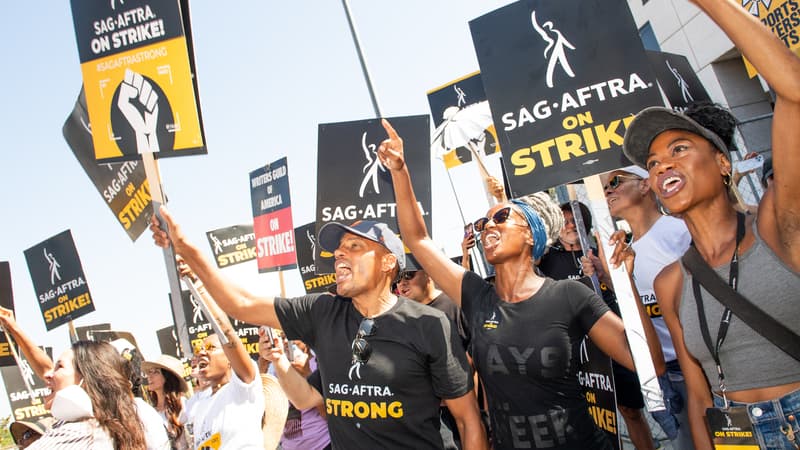The Hollywood writers’ strike, which currently paralyzes the production of films and series in the United States, reached the symbolic threshold of 100 days on Wednesday, industry pens attributing this symbolic “shameful” level to the studios. After more than three months of strike, the gap between the powerful writers union (WGA) and the heads of the studios and streaming platforms seems still open. No agreement has been reached to better remunerate screenwriters with the benefits of streaming, nor to regulate the use of artificial intelligence (AI) in the industry.
Since the beginning of this social movement, the two parties have barely spoken. And in mid-July, the crisis worsened with the actors’ going on strike, who have similar demands. Almost completely paralyzed, Hollywood had not experienced a double social movement since the 1960s.
The studios “bear full responsibility for shutting down the industry,” the union added in a statement, saying meeting the strikers’ demands would cost “far less than the damage caused by their intransigence.”
The last meeting between scriptwriters and studios came to nothing
The last writers’ strike, in 2007-2008, lasted 100 days and cost the Californian economy $2.1 billion, according to an estimate by the Milken Institute. But this time, there is no way out in sight. After three months of silence on the radio, writers and studios resumed dialogue on Friday, during a meeting that would allow them to consider reopening negotiations. But this meeting came to nothing. A few hours before the meeting, the WGA questioned the bona fides of the studies in a message addressed to its members. The employers reacted by denouncing “regrettable” rhetoric.
For Charlie Kesslering, present this Wednesday at a picket outside the Netflix offices in Los Angeles, the writers’ fight is an “existential fight” and “it will take much more than 100 days for the motivation to disappear.” “It’s about ensuring that the races we love so much continue to be races and continue to be a viable way to make a living,” added the screenwriter. A determination also insistently proclaimed by the WGA. “The studios have no choice but to reach a fair agreement,” the union hammered in its press release. “In the meantime, we remain resolute and united.”
A slightly less incisive management stance
The writers and actors camp in their positions because they are scalded by the arrival of streaming. Over the past decade, this new model has revolutionized their “residual” pay, which arises from each iteration of a movie or series and allows them to live between two projects. Interesting with television because calculated based on the price of the ads, these fees are much lower with streaming platforms, which do not disclose their audience numbers and pay a flat rate, regardless of success. The emerging use of artificial intelligence, capable of writing scripts or cloning the voice and image of actors, only adds fuel to the fire.
Conflict may be raging, but the focus seems to be evolving towards a slightly less incisive stance on the part of employers. After criticizing strikers’ “unrealistic” demands in mid-July, Disney boss Bob Iger struck a more conciliatory tone on Wednesday. Unveiling the group’s results, which coincided with the 100th day of the strike, he said he was “personally involved” in finding a way out of the crisis, expressing “his deep respect” for the creative people at his company and the industry. ‘industry.
Source: BFM TV


